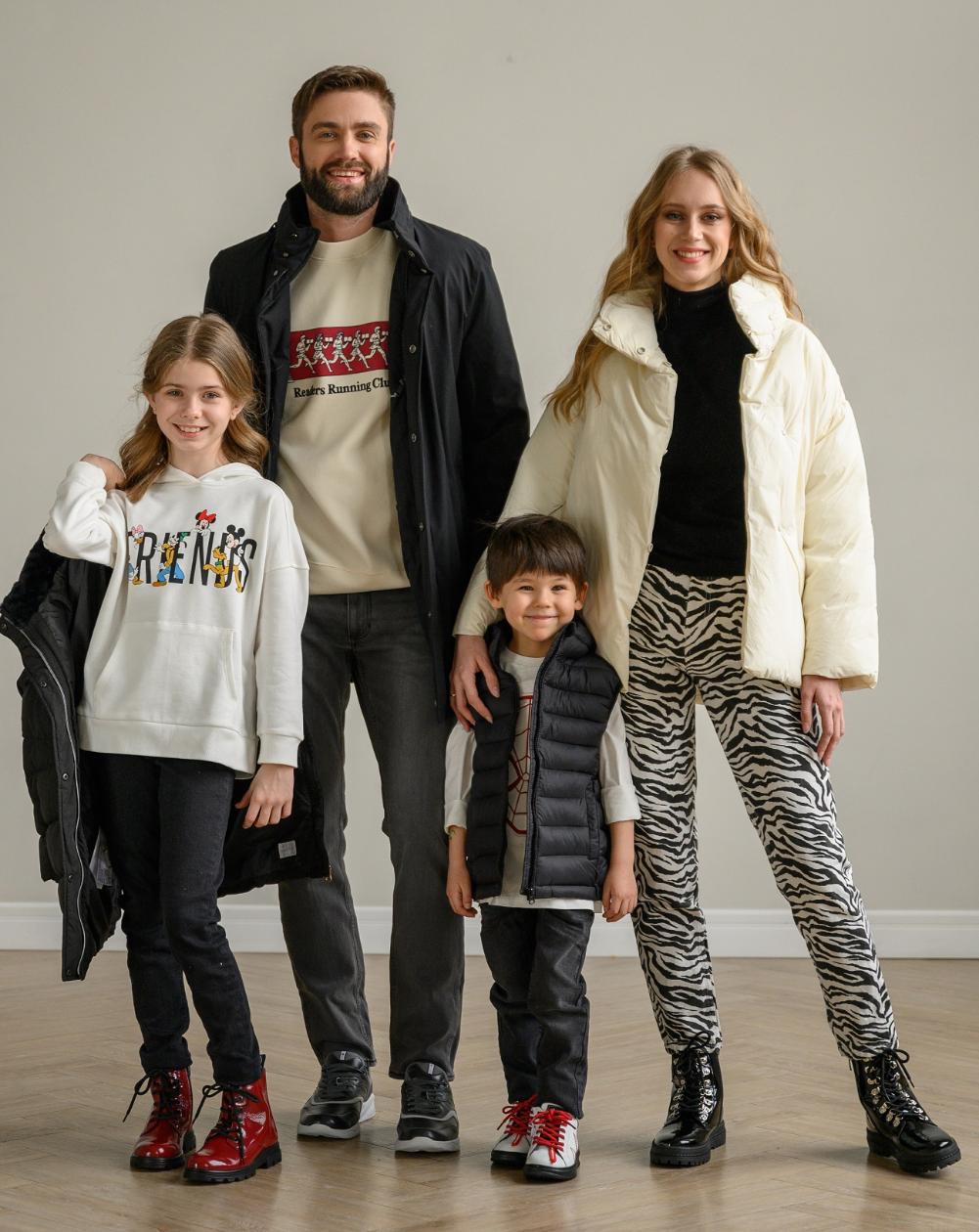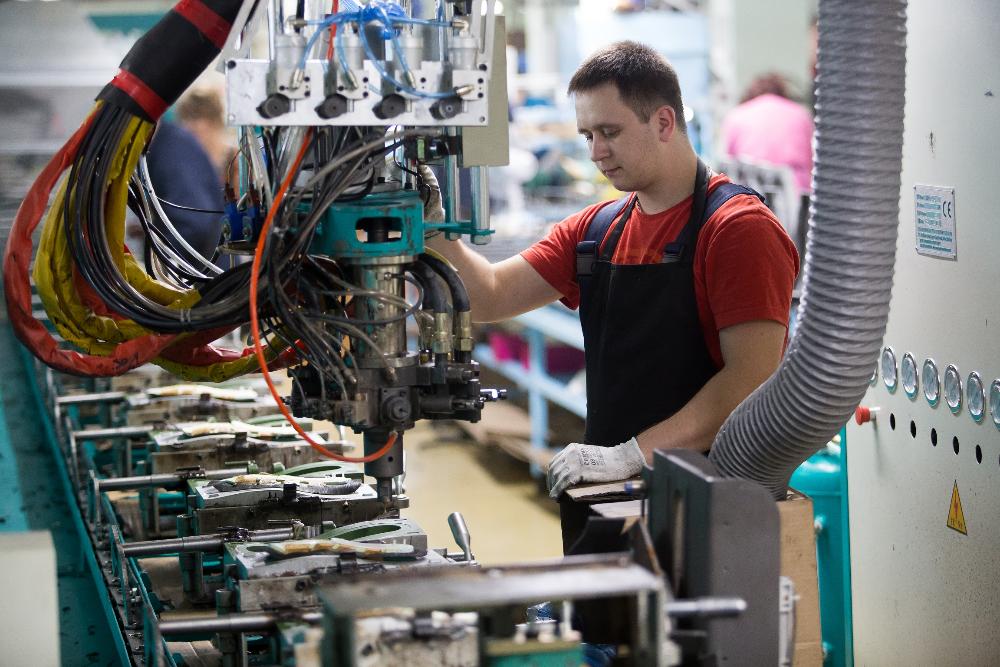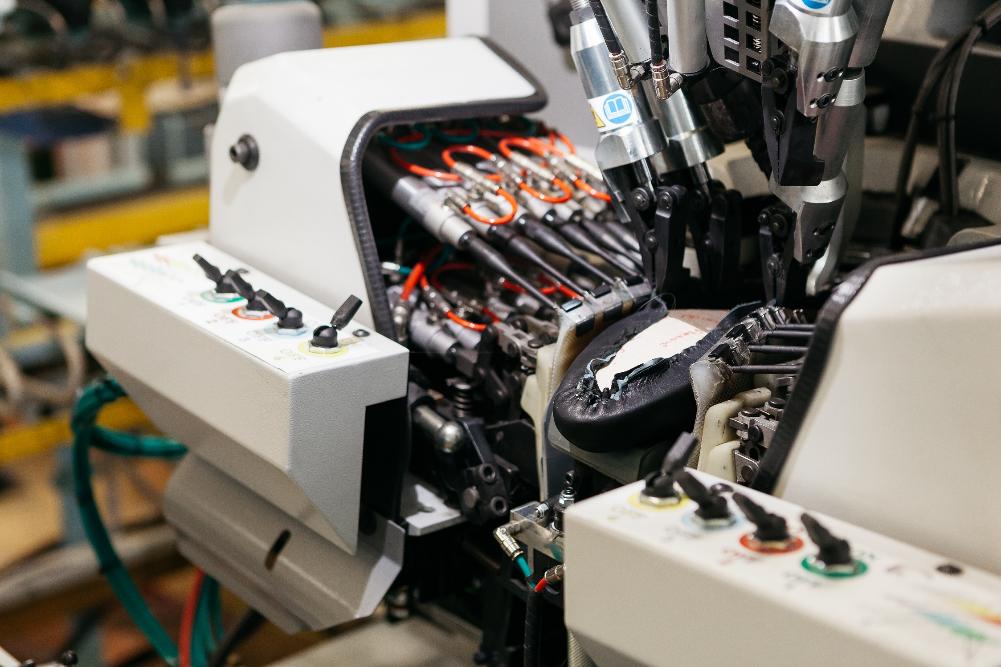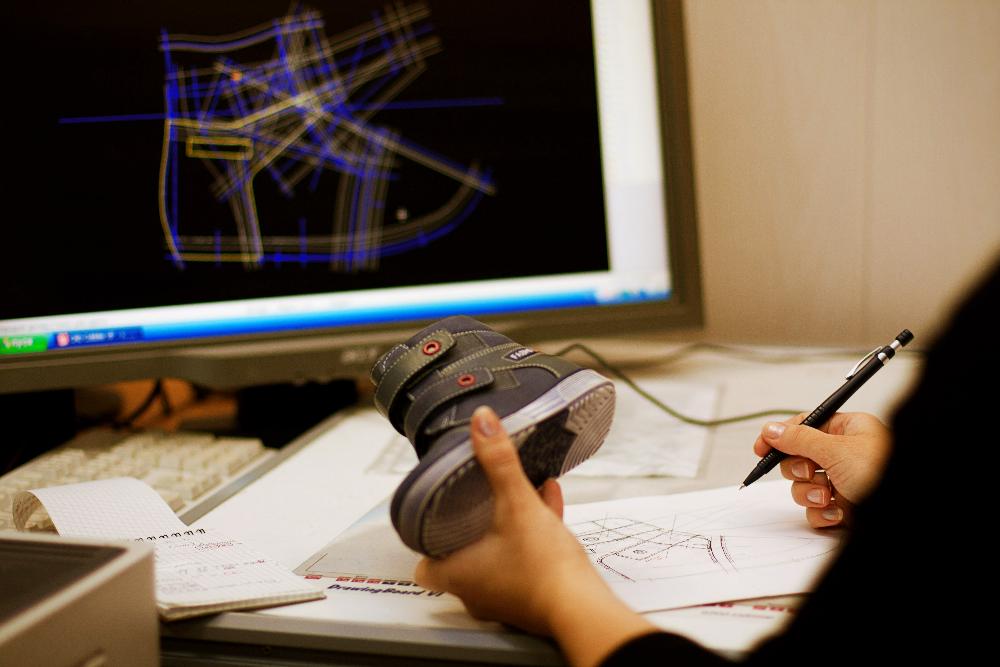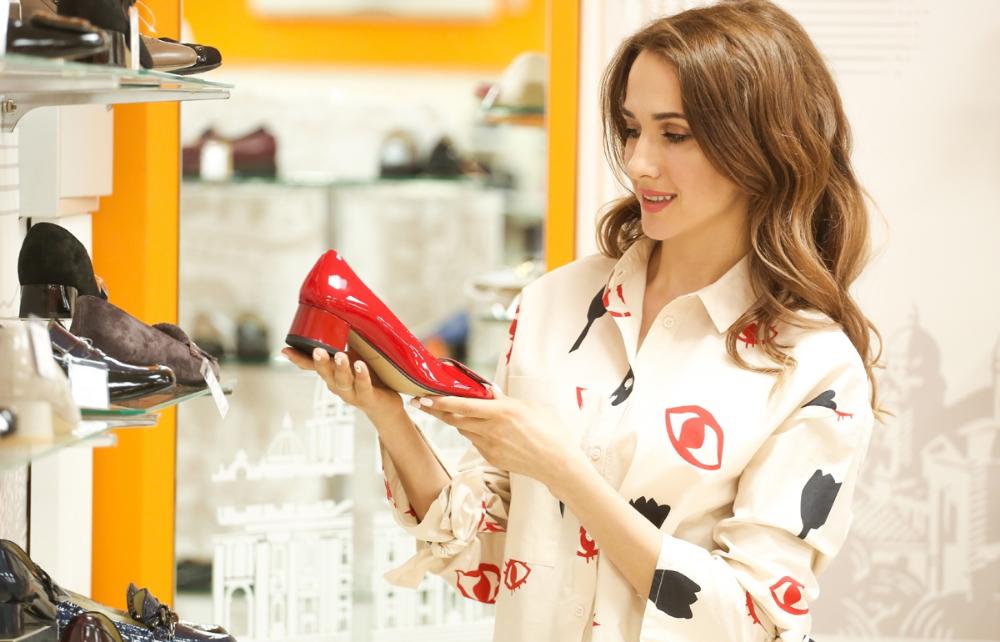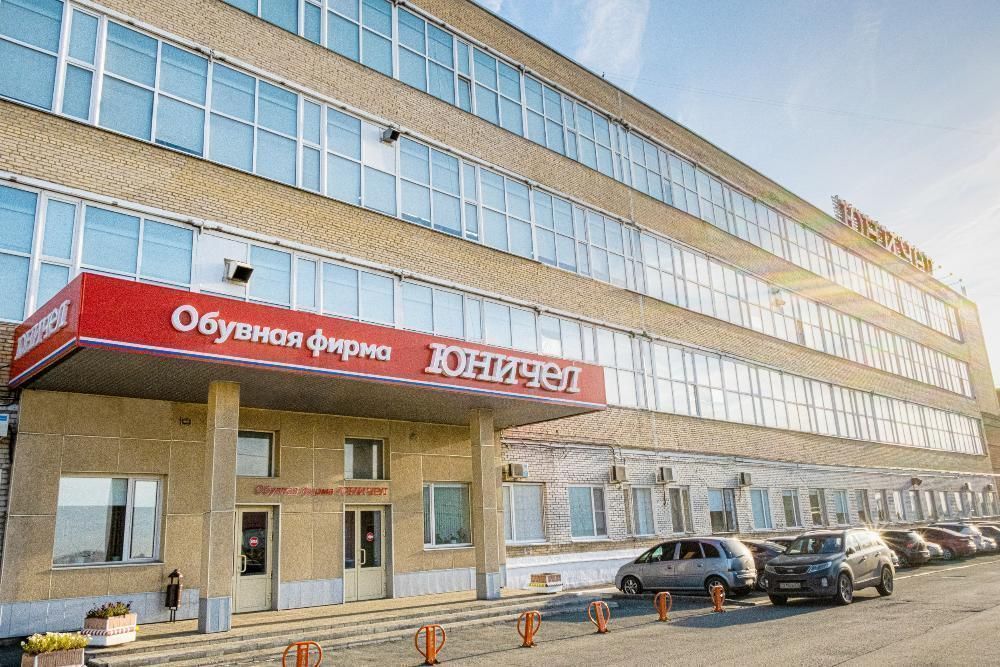
The balance in the market will be determined by the availability of shoes

Vladimir Denisenko, General Director of the Russian shoe company Unichel, talks about the new market situation, the prospects for import substitution in the industry and the future of Russian shoemakers
Economic conditions have changed radically in recent months, but the full realization of the new reality will come later. For the time being, something continues to be done by inertia, on the basis of old stocks of components and materials, and production plans, current business tasks have not been canceled. Operational activities do not provide an opportunity to immerse ourselves in reflections on the uncertainty in which we find ourselves. About how much retail prices for shoes will grow, whether Russian manufacturers will be able to replace imported components and materials for shoes, what is dangerous for shoe companies parallel imports, about adjusting development plans, in an exclusive interview with SR, the CEO of the Russian shoe company Unichel spoke Vladimir DENISENKO.
Vladimir Stepanovich, against the backdrop of a general rise in prices, one of the most pressing questions is: how much has the price of Unichel shoes increased for the end consumer?
The price has of course increased throughout the footwear market and we are no exception. The reasons are quite understandable and known to everyone - fluctuations in the exchange rate, rising prices for materials and components, rising costs of logistics. But if for everyone else it has grown by 30-100%, then we have, on average, by 12-15%.
When pricing, we proceed from the fact that most of our materials are Russian, the import component is no more than 30%, and we reduce it. The work was started long before the events of the last two years, and its results have the best effect on both the cost price and the containment of price growth. Now we are forced to buy everything at new prices, change some suppliers - in general, we are thoroughly working with the cost price so that it grows within reasonable limits.
This will continue in the future, but the final price depends on the dollar exchange rate and the economic situation as a whole, on whether the consumer's solvency will remain. So far, our sales are going well, with a good increase compared to last year. What to expect next when the consumer runs out of money, and he starts to leave them only for food? This is still a question, and today no one will be able to tell you what the final price of shoes will be.
But in general, the balance in the market will be determined by the availability of shoes. And in the winter season, we predict that it may already be less, because delivery times are missed, enterprises are trying to buy less in advance, and in general they avoid big expenses, and on the other hand, the consumer is getting poorer.
Nevertheless, the Unichel factory produces a winter collection, about 50-60% of all materials for it were purchased before the special operation at an adequate rate, the rest will be paid at current prices and, I think, we can keep prices below the market.
Is it possible to completely replace imported components with Russian ones, or will it be necessary to abandon the production of some models?
We will change some of the components for Russian ones, but, basically, we are talking about another replacement here. If earlier we bought some items in Italy, now we are starting to try, for example, in Turkey - cardboard, interlining materials. And, in principle, this is the same import, but more reliable and less risky supplies appear. Although the price gain is small. Some materials were purchased in China, but this country scares us with uncertainty and delays in deliveries, it is necessary to start deliveries of materials a very long time ago. Now in production - a difficult period of restructuring of all processes.
But it is still impossible to completely replace imported components with Russian ones: there are simply no cardboards in Russia, high-quality threads, too - such that would be guaranteed to replace German and Italian ones. Therefore, for the time being, in terms of complete import substitution of components and materials for footwear, the prospects are vague, although we are looking and trying.
Finding a replacement is not the only problem. Today, the factory is equipped with the latest modern equipment, and, for example, German and Italian equipment works on Gutterman threads. We tried threads from other manufacturers, but somewhere the twist does not match, somewhere - the speed, and of course, “native” ones are better. Although in any case, you can replace it, but the sewing quality will not improve from this.
The most prosperous situation with leather: for a long time we worked with large volumes of Korean, Turkish, Spanish leather, but over the past two or three years we have almost completely gone towards Russian leather and, as it turned out, we were moving in the right direction. Domestic leather is also of decent quality - for men's, children's, and women's shoes. Another thing is that the Russian tanneries themselves began to change prices, referring to the increase in the cost of raw materials and chemicals. We work with everyone, adjusting the volume of orders, based on price and quality.
As for thermoplastic elastomers for the production of soles, they learned how to make granules in the Moscow region, partly in Kirov. Previously, we bought this raw material in Italy, now we are considering proposals from Russian enterprises. I think we will be able to work on domestic materials without loss of quality. Ceteris paribus, we will make a choice in favor of domestic companies, with foreign ones - complex logistics, indistinct deliveries, tense situation at the borders, strict prepayment requirements. But as for polyurethanes, we can say that the situation is hopeless, even if the factory is located in Russia, it carries all the components from Germany and Italy.
Now many suppliers are trying to show their worth, either from their own naivety, or from the desire to seize the moment and not miss their own. Relationship stability is the most important thing that is valued. Payments, schedules, deferred payments - you have to meet everyone you can, and everything will be fine. And trying to drive partners into a corner in a difficult situation and prove your own indispensability is a road to nowhere. Stability will come, but no one will return to you, there will still be other channels.
It is in such situations that the decency of suppliers and the quality of business relations are determined. I don't like it when they twist their arms. I always build a business by playing for the long haul. We have lived through four crises and have come out of each with our heads up. We do everything to keep our feet on the ground. And so far we've got it.
I see that at the moment it is impossible to completely abandon imports. Rather, imports will simply change geography - from Europe to Southeast Asia. 80% of the shoes in the world are made in China, including good and expensive ones, from normal materials. It's a question of price, quality and time.
And the replacement of Italian components will not worsen the quality?
No. We have not been buying interlinings and accessories in Italy for a long time, because it is too expensive. They also gradually abandoned the purchase of soles, buying only individual styles, for example, winter “anti-icing” with spikes. Long before all today's events, we already had a natural process to reduce the volume of purchases from Italy, and now it has simply accelerated. I don’t see anything wrong here, the quality will not suffer, the assortment too.
Returning to the issue of import substitution in our industry: it is a myth that Russian components and Russian equipment will appear on the market right now. To create an efficient production from scratch, years are needed - work, investments, enthusiasm and nerves, specialists, equipment and, most importantly, the desire to do it profitably.
Today, it is more profitable to bring shoes to Russia than to sew here, because for Russian manufacturers in our sector, if the profitability of 5-7% is already great. But if you make even one mistake, you will lose. I have repeatedly said that we need to think about supporting the shoe industry, the production of materials and components, but it was believed that there is Chinese - and good.
It would seem that we are super-professionals, we do everything on our own: pads, blanks, insoles, we produce soles from polyurethane and thermoplastic elastomer - in fact, Unichel is a shoe empire that almost completely meets its needs, nowhere in Europe. We have been doing this all our lives, even in the most difficult conditions. And now, when the situation in the world seems to give odds to Russian manufacturers, we cannot increase production, launch new flows, and recruit new equipment is simply impossible. Keep what you have now...
I have no illusions that new domestic players will enter the market now. Maybe the market will turn white, it will become clear who "sewed in the dark" and who is official. But no one will grow up. If only by 10-15% - God forbid, and if by 20% in a year or two - they are just heroes. But I don't believe in it.
What is your opinion on the legalization of parallel imports. How might this affect the footwear segment?
This is a story about when, under a good pretext, smuggled products begin to be laundered. Russia has been littered with smuggling without parallel imports before, more than 60% of shoes on the Russian market were smuggled. And now we are in danger of getting the same thing. As it will be? Previously, for example, Adidas could be brought to the Russian Federation only with the permission of Adidas, but now they will take everything and say: “We don’t need permission, because this is Adidas.” And who will confirm the authenticity of the goods?
In fact, the legalization of gray trade may occur, which is very bad for everyone. Anyone who needs to buy a real Gucci bag will buy it, and this segment of buyers in Russia is the least of all to worry about. We have to worry about those 80% that everyone buys only fake, because there is no money for other goods. These people will be quite satisfied if the bag or shoes are of high quality and relevant, but from a different manufacturer, even if not a well-known one. The desire is quite normal, and marketplaces want to legitimize the status of dubious goods in order to make money on this business legally and on a large scale. From the point of view of the buyer, the advantages in the form of a breadth of choice and the availability of any brand are obvious. But I, as a production worker, am not a supporter of such innovations.
Will the company's development strategy change taking into account the current situation?
The fact is that now no one knows in which direction the situation will go, and how it will end. So it's premature to say anything now. Unfortunately, everything is tense. I can say that we are working, retaining staff, our shoes are in demand.
Specifically, the winter collection, which is now being produced at the factory, has undergone any changes in the number of models, in their appearance?
The collections are sewn according to the previously planned plan, we have corrected no more than 5% of the collection: we have combined some models, revised the color schemes taking into account the situation - slightly reduced the number of white and beige models. For the collection of the next autumn and winter, everything was purchased and charged in advance. Models are developed, orders are made, equipment is available or on the way. But for the spring-summer 2023 collection, which is now in development, we are already taking into account the optimization of supplies, materials, weighing what we can really do and what we can’t do because of the supply problems that are now looming.
Will new Unichel stores open?
Today the situation is such that our franchise network sells without any transformation what we produce. And sales are growing - partly due to the rush demand, the change of seasons in March-April, partly due to our prices, which we keep below market prices. The entire volume that we produce is sold and in demand. In the current situation, we have slowed down the work on opening stores in shopping malls, as it is not yet clear whether all the brands that have temporarily suspended their work will leave, and how this will affect traffic.
But I must say that landlords have become more understanding and accommodating: we continue to cooperate with those who meet halfway, and in general we are working on the efficiency of trade. Now we are investing less in advertising campaigns, because the best advertising is a nice store, a good seller and your friend who said that he received good service when buying at Unichel, he liked the shoes themselves, and he bought three couples. This is the best advertisement.
Opening a store in a shopping center requires serious investments, and we are forced to save money, we need money to pay salaries to the teams. We have already indexed and increased the salaries of each employee. These costs are strategically more important for us now. Times are difficult and unstable, we understand that our people need to be helped.
The possible withdrawal of Western players from our market is carte blanche for Russian brands…
Russian brands have never been hindered by Zara, H&M or anyone else. They did not sell some sky-high shoes, but ordinary models, maybe more intelligently made, more daring in design, coming complete with clothes in a single capsule. But they cost an order of magnitude more expensive than our products.
Our competitor has always been illegal China, from which shoes were brought, but many and often "gray" ways, trucks, through Kazakhstan. And only he competed with us on price. Recently, thanks to the introduction of labeling, the market has whitened, although not completely. There are fewer such Chinese products, so it has become a little easier for us to sell.
In our country, there are very low duties on the import of shoes from abroad, with such duties there will never be production in Russia. It is necessary that the duties on the import of shoes from abroad be at least 10-15%, as is done all over the world, then it will be profitable for Russian manufacturers to work. And only then the domestic manufacturer will be able to invest in development and build a business for the future. And now, I repeat, it is more profitable to bring from China and sell it, so we can say this: is it profitable to produce in Russia? - Not; Trade? - Yes.
What changes will be in online trading?
Unichel is represented on the main marketplaces, we feel quite confident and systematically grow every year, these are good prospects for us, more in terms of image, increasing brand awareness, including in neighboring countries, where, for example, our offline - there is no difference.
If we talk about marketplaces in general, then if supplies of cheap products from China are established through them, and all this will be sold in crazy volumes, because there are no taxes, no labeling, no control over the environment, over materials, over the veracity of the information indicated, there is no, if synthetics are passed off as leather, then online trading will flourish.
What is your forecast: how can the alignment of forces in the Russian shoe market change? Who will dictate the rules, and what share can Russian producers take?
Smuggling, if any, will dictate the rules, as well as gray and black imports - mass deliveries of such shoes. Unfortunately, they determine the rules of the game in the mass market today. If all this continues, then nothing will change: as it was hard for domestic shoemakers, it will be so. It has always been difficult for them anyway, and now there are added difficulties with logistics, interruptions in supplies, and the requirement for prepayment.
Until there are normal conditions for taxation for Russian producers in the light industry, nothing will change. Now we pay 30% of social taxes, while enterprises with half the number of employees than ours pay 15%. The conclusion about how it is better for Russian big business to live suggests itself. But I don't want to play these games. It turns out that all our laws are not aimed at supporting large enterprises. Today we have 6% of real production - in small and medium-sized enterprises, the rest are intermediaries, and we are growing them. But it is necessary to create conditions for industrial enterprises so that it would be profitable for production workers to develop, and not go into the shadows.
Dear our subscribers!!!
Read this and other exclusive materials, expert opinions and industry news in our Telegram channels
| Please rate the article |
Materials on the topic
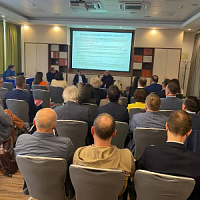
Results of the round table of shoemakers with the Ministry of Industry and Trade of the Russian Federation, CRPT, NOBS and Wildberries

World Footwear Yearbook: Global footwear production reaches 23,9 billion pairs and is back to pre-pandemic levels
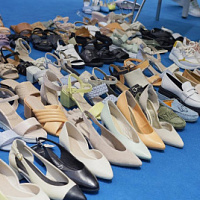
How to double the sales of a shoe store?
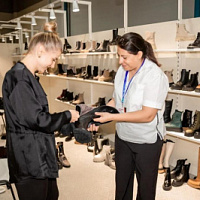
New direction of exhibitions in Alma-Ata: Euro Shoes @ Elite Line & CAF
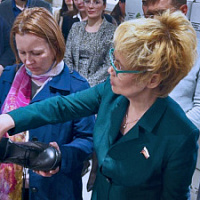
Round table with representatives of shoe factories of Dagestan with the support of the Ministry of Industry and Trade and NOBS
Popular
 Coach turned to Big Data analysis and won the interest of a young audience
American handbag brand Coach has planned the success of its Tabby model among a younger audience, Generation Z, by turning to big data analysis, abandoning traditional and analogue tools, such as human intuition or the ability of any executive to sense “which way the wind will blow,” writes B.O.F.
Coach turned to Big Data analysis and won the interest of a young audience
American handbag brand Coach has planned the success of its Tabby model among a younger audience, Generation Z, by turning to big data analysis, abandoning traditional and analogue tools, such as human intuition or the ability of any executive to sense “which way the wind will blow,” writes B.O.F.
 IDOL updates the concept
The IDOL brand, part of the Melon Fashion Group portfolio, opened the first flagship in an updated concept in the Aviapark shopping center in Moscow.
IDOL updates the concept
The IDOL brand, part of the Melon Fashion Group portfolio, opened the first flagship in an updated concept in the Aviapark shopping center in Moscow.
 Seven “sins” of the shoe business. How do owners harm the company with their own hands?
Why is Company X able to create a strong, profitable brand, but Company Y is struggling to make ends meet? Many people prefer to attribute success to luck, luck, or the support of strong patrons. And few people ask themselves the question: “What am I doing wrong?” Moreover, many entrepreneurs begin to harm their business from the first day of its opening. In this article, together with SR expert in the field of fashion business management and development, Maria Gerasimenko, we will look at the 7 main “sins” that business owners commit using specific examples.
Seven “sins” of the shoe business. How do owners harm the company with their own hands?
Why is Company X able to create a strong, profitable brand, but Company Y is struggling to make ends meet? Many people prefer to attribute success to luck, luck, or the support of strong patrons. And few people ask themselves the question: “What am I doing wrong?” Moreover, many entrepreneurs begin to harm their business from the first day of its opening. In this article, together with SR expert in the field of fashion business management and development, Maria Gerasimenko, we will look at the 7 main “sins” that business owners commit using specific examples.
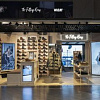 Current techniques in lighting a shoe store
Today, walking through the galleries of shopping centers, we see a variety of formats of offline stores. New concepts of retail spaces attract with an individual, memorable design. In a certain sense, they are an element of the show, a tool through which the buyer receives a new and interesting experience. Together with SR expert in the field of lighting technology in retail, Tatyana Ryzhova, we will look at current lighting design techniques for modern shoe stores, which we will see more and more often in new retail outlets in the near future.
Current techniques in lighting a shoe store
Today, walking through the galleries of shopping centers, we see a variety of formats of offline stores. New concepts of retail spaces attract with an individual, memorable design. In a certain sense, they are an element of the show, a tool through which the buyer receives a new and interesting experience. Together with SR expert in the field of lighting technology in retail, Tatyana Ryzhova, we will look at current lighting design techniques for modern shoe stores, which we will see more and more often in new retail outlets in the near future.
 Louis Vuitton opens a new factory in Italy
Louis Vuitton has opened its second shoe factory in Italy. After opening the first one in Fiesso d'Artico in Veneto, the LVMH flagship brand has just opened a new production site dedicated to this category of footwear in the industrial zone of Civitano in the Marche region. There is also another brand production facility in Tuscany, where bags and leather accessories are produced, writes fr.fashionnetwork.com.
Louis Vuitton opens a new factory in Italy
Louis Vuitton has opened its second shoe factory in Italy. After opening the first one in Fiesso d'Artico in Veneto, the LVMH flagship brand has just opened a new production site dedicated to this category of footwear in the industrial zone of Civitano in the Marche region. There is also another brand production facility in Tuscany, where bags and leather accessories are produced, writes fr.fashionnetwork.com.
 The Euro Shoes@CAF exhibition will be held in Almaty
From March 11 to 13, the Euro Shoes@CAF (Central Asia Fashion) exhibition will be held in Almaty at the Atakent exhibition complex. The exhibition, which is the largest international event in the fashion industry in Central Asia, will present collections of clothing, shoes and accessories.
The Euro Shoes@CAF exhibition will be held in Almaty
From March 11 to 13, the Euro Shoes@CAF (Central Asia Fashion) exhibition will be held in Almaty at the Atakent exhibition complex. The exhibition, which is the largest international event in the fashion industry in Central Asia, will present collections of clothing, shoes and accessories.
 Euro Shoes will start operating on February 19 in Moscow!
The winter session of the international exhibition of footwear and accessories Euro Shoes premiere collection will be held in Moscow at the Expocenter from February 19 to 22. The organizers promise the presence of all the main participants at the exhibition, as well as new names from Europe, Asia and Russia.
Euro Shoes will start operating on February 19 in Moscow!
The winter session of the international exhibition of footwear and accessories Euro Shoes premiere collection will be held in Moscow at the Expocenter from February 19 to 22. The organizers promise the presence of all the main participants at the exhibition, as well as new names from Europe, Asia and Russia.
 American buyers couldn't buy Birkin bags and sued Hermès
French fashion house Hermès is facing a lawsuit in California from two customers who were unable to purchase exclusive Birkin bags. The fashion house is accused of unfair commercial practices.
American buyers couldn't buy Birkin bags and sued Hermès
French fashion house Hermès is facing a lawsuit in California from two customers who were unable to purchase exclusive Birkin bags. The fashion house is accused of unfair commercial practices.
 Why Rendez-Vous and Yandex Lavka released a “bread bag”
Shoe retailer Rendez-Vous announced the launch of a spring collaboration with Yandex Lavka and released a roll that resembles the shape of a woman’s handbag. This “Bread Bag” is presented in the Yandex.Lavka application at a price of 249 rubles. On the product packaging there is a promotional code for 1000 rubles, which can be spent in the Rendez-Vous network.
Why Rendez-Vous and Yandex Lavka released a “bread bag”
Shoe retailer Rendez-Vous announced the launch of a spring collaboration with Yandex Lavka and released a roll that resembles the shape of a woman’s handbag. This “Bread Bag” is presented in the Yandex.Lavka application at a price of 249 rubles. On the product packaging there is a promotional code for 1000 rubles, which can be spent in the Rendez-Vous network.
 Camper has released innovative sneakers - designers
Spanish brand Camper's new Roku sneaker features six interchangeable components to create up to 64 different looks and color combinations. Roku means "six" in Japanese.
Camper has released innovative sneakers - designers
Spanish brand Camper's new Roku sneaker features six interchangeable components to create up to 64 different looks and color combinations. Roku means "six" in Japanese.
 Turkish brand Vaneda on Euro Shoes
Street style, sport, outdoor, military – the main style directions of footwear of the company from Turkey
Turkish brand Vaneda on Euro Shoes
Street style, sport, outdoor, military – the main style directions of footwear of the company from Turkey
 Christian Louboutin presented a collection in a cowboy style
At the Loubi Show in Paris, the French luxury brand Christian Louboutin presented its fall 2024 collection, following the trend - in the style of the Wild West. It included cowboy boots and rhinestone loafers.
Christian Louboutin presented a collection in a cowboy style
At the Loubi Show in Paris, the French luxury brand Christian Louboutin presented its fall 2024 collection, following the trend - in the style of the Wild West. It included cowboy boots and rhinestone loafers.
 Fashion Week takes place in Moscow
Fashion Week takes place in the Russian capital. Events include fashion shows, markets where you can purchase clothes, bags and accessories, and a B2B Showroom for fashion industry professionals.
Fashion Week takes place in Moscow
Fashion Week takes place in the Russian capital. Events include fashion shows, markets where you can purchase clothes, bags and accessories, and a B2B Showroom for fashion industry professionals.
 We are ready for active development in the Russian market
Friedrich Naumann, CEO of the Tamaris brand, told Shoes Report about the company’s ambitious plans, business development in Russia and expansion of the retail network, and also shared details about new collections and launches.
We are ready for active development in the Russian market
Friedrich Naumann, CEO of the Tamaris brand, told Shoes Report about the company’s ambitious plans, business development in Russia and expansion of the retail network, and also shared details about new collections and launches.
 Fashion trends Fall-Winter 2023/24 for commercial footwear purchases
Permanent contributor to Shoes Report. Elena Vinogradova, an expert in sales and purchases in the fashion business, prepared an overview of the trends for the autumn-winter 2023/24 season especially for us.
Fashion trends Fall-Winter 2023/24 for commercial footwear purchases
Permanent contributor to Shoes Report. Elena Vinogradova, an expert in sales and purchases in the fashion business, prepared an overview of the trends for the autumn-winter 2023/24 season especially for us.
 MSCHF and Crocs launch "Big Yellow Boots"
Creator of the Big Red Boots, Brooklyn brand MSCHF has teamed up with American plastic clog and sandal brand Crocs for another oversized shoe. The new Big Yellow Boots will go on sale on August 9th.
MSCHF and Crocs launch "Big Yellow Boots"
Creator of the Big Red Boots, Brooklyn brand MSCHF has teamed up with American plastic clog and sandal brand Crocs for another oversized shoe. The new Big Yellow Boots will go on sale on August 9th.
 Five rules of professional lighting for a shoe store - something that is relevant in any season
When developing a lighting concept for shoe retailers, it is important to take into account not only the history of the brand, the architectural content of the premises, the target audience of the stores, but also the seasonality of the goods. With the onset of the cold season, client preferences change: bright weightless shoes are replaced by more massive models in discreet dark colors. Despite significant differences in summer and winter collections, the overall philosophy of the brand, its recognition should remain unchanged at any time of the year. Tatyana Ryzhova, an SR lighting expert in fashion retail, has identified five basic rules for a competent lighting concept for a shoe store for readers of the magazine, which will help to present winter assortment to customers in a winning way.
Five rules of professional lighting for a shoe store - something that is relevant in any season
When developing a lighting concept for shoe retailers, it is important to take into account not only the history of the brand, the architectural content of the premises, the target audience of the stores, but also the seasonality of the goods. With the onset of the cold season, client preferences change: bright weightless shoes are replaced by more massive models in discreet dark colors. Despite significant differences in summer and winter collections, the overall philosophy of the brand, its recognition should remain unchanged at any time of the year. Tatyana Ryzhova, an SR lighting expert in fashion retail, has identified five basic rules for a competent lighting concept for a shoe store for readers of the magazine, which will help to present winter assortment to customers in a winning way.
 I doubt and object: how to find an approach to difficult clients?
How good and serene would be the work of a salesperson if the customers were calm, cheerful, always knew exactly what they wanted, and bought, bought, bought! It is a pity that this is possible only in dreams. Therefore, we will not dream, but we will act. Together with Maria Gerasimenko, a permanent author of SR, we understand the doubts and objections of buyers and build a strategy for working with them. Our expert pays special attention to the two main objections of buyers, on which 82% of sales are lost.
I doubt and object: how to find an approach to difficult clients?
How good and serene would be the work of a salesperson if the customers were calm, cheerful, always knew exactly what they wanted, and bought, bought, bought! It is a pity that this is possible only in dreams. Therefore, we will not dream, but we will act. Together with Maria Gerasimenko, a permanent author of SR, we understand the doubts and objections of buyers and build a strategy for working with them. Our expert pays special attention to the two main objections of buyers, on which 82% of sales are lost.
 EURO SHOES presents an updated section of the GLOBAL SHOES exhibition with collections of shoe and bag brands from Asian countries
EURO SHOES premiere collection is expanding. Along with the traditional pool of leading European footwear brands from Germany, Spain, Italy and Turkey, several dozen footwear and bag brands from the Middle Kingdom will be presented in the GLOBAL SHOES section at the Moscow Expocentre from August 29 to September 1.
EURO SHOES presents an updated section of the GLOBAL SHOES exhibition with collections of shoe and bag brands from Asian countries
EURO SHOES premiere collection is expanding. Along with the traditional pool of leading European footwear brands from Germany, Spain, Italy and Turkey, several dozen footwear and bag brands from the Middle Kingdom will be presented in the GLOBAL SHOES section at the Moscow Expocentre from August 29 to September 1.
 World Footwear Yearbook: Global footwear production reaches 23,9 billion pairs and is back to pre-pandemic levels
The Portuguese association of shoe manufacturers APICCAPS published the 13th edition of the international statistical bulletin World Footwear Yearbook for 2023, according to which in 2022 the production and export of shoes worldwide increased by 7,6% and 9%, respectively, and the world production of shoes reached 23,9 billion couples and returned to pre-pandemic levels.
World Footwear Yearbook: Global footwear production reaches 23,9 billion pairs and is back to pre-pandemic levels
The Portuguese association of shoe manufacturers APICCAPS published the 13th edition of the international statistical bulletin World Footwear Yearbook for 2023, according to which in 2022 the production and export of shoes worldwide increased by 7,6% and 9%, respectively, and the world production of shoes reached 23,9 billion couples and returned to pre-pandemic levels.
 Rostov footwear brand Novak presented a collection of sneakers and sneakers
In the spring-summer 2023 season, the Rostov-on-Don shoe brand Novak presented a cute collection of sneakers and sneakers for every day. The upper of the shoe is made of genuine leather, suede, nubuck, the sole is made of light EVA.
Rostov footwear brand Novak presented a collection of sneakers and sneakers
In the spring-summer 2023 season, the Rostov-on-Don shoe brand Novak presented a cute collection of sneakers and sneakers for every day. The upper of the shoe is made of genuine leather, suede, nubuck, the sole is made of light EVA.
 Jacquemus x Nike collaboration released
The second collaboration between Jacquemus and Nike, which has been talked about so much, is finally out. The appearance of the couple for many was a surprise. The model of Nike Air Force 1 sneakers, which was taken as the basis of the new collection, has undergone significant changes.
Jacquemus x Nike collaboration released
The second collaboration between Jacquemus and Nike, which has been talked about so much, is finally out. The appearance of the couple for many was a surprise. The model of Nike Air Force 1 sneakers, which was taken as the basis of the new collection, has undergone significant changes.
 Crocs releases a collaboration with Barbie
If Barbie ditched heels and wore crocs, they would be pink. It was this collection in pink that was released by the American brand of plastic clogs Crocs, for the release of the film "Barbie" in the United States.
Crocs releases a collaboration with Barbie
If Barbie ditched heels and wore crocs, they would be pink. It was this collection in pink that was released by the American brand of plastic clogs Crocs, for the release of the film "Barbie" in the United States.
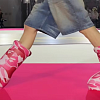 Japanese BAPE takes to the catwalk MSCHF Big Red Boots
The story of Brooklyn brand MSCHF's oversized rubber boots continues. The last time they made noise in the auditorium was at the Rick Owens menswear show. Now they have already appeared on the podium.
Japanese BAPE takes to the catwalk MSCHF Big Red Boots
The story of Brooklyn brand MSCHF's oversized rubber boots continues. The last time they made noise in the auditorium was at the Rick Owens menswear show. Now they have already appeared on the podium.
 Shoe educational program: what shoe soles are made of
“What is the difference between TEP and EVA? What does tunit promise me? Is PVC glue? What is the sole of these shoes made of? ”- the modern buyer wants to know everything. In order not to smash his face in front of him and be able to explain whether such a sole suits him in soles, carefully read this article. In it, process engineer Igor Okorokov tells what materials the soles of shoes are made of and what makes each of them so good.
Shoe educational program: what shoe soles are made of
“What is the difference between TEP and EVA? What does tunit promise me? Is PVC glue? What is the sole of these shoes made of? ”- the modern buyer wants to know everything. In order not to smash his face in front of him and be able to explain whether such a sole suits him in soles, carefully read this article. In it, process engineer Igor Okorokov tells what materials the soles of shoes are made of and what makes each of them so good.
 How to set prices that will earn
Some businessmen still confuse the concept of margin with the concept of trade margins and set prices for their goods, guided solely by the example of competitors. No wonder they go broke! Analyst at the Academy of Retail Technologies Maxim Gorshkov gives several tips and formulas with which you can set not only ruinous, but also profitable prices.
How to set prices that will earn
Some businessmen still confuse the concept of margin with the concept of trade margins and set prices for their goods, guided solely by the example of competitors. No wonder they go broke! Analyst at the Academy of Retail Technologies Maxim Gorshkov gives several tips and formulas with which you can set not only ruinous, but also profitable prices.
 Sales of shoes and accessories: effective techniques for business rhetoric
Which speech modules are effective in communicating with potential and current customers of shoe stores, and which are not, Anna Bocharova, a business consultant, knows.
Sales of shoes and accessories: effective techniques for business rhetoric
Which speech modules are effective in communicating with potential and current customers of shoe stores, and which are not, Anna Bocharova, a business consultant, knows.
 We form the salary of sellers: expert advice
“How do you charge your consultants for personal or general sales?” Is one of the most popular questions causing a lot of controversy and gossip on the online forums of retail business owners. Indeed, how to properly form the earnings of sellers? But what about bonuses, where to get a sales plan from, do employees allow them to buy goods at discounted stores? In search of truth, the Shoes Report turned to a dozen shoe retailers, but no company wanted to disclose its motivation system - the process of its development was too complicated and individual. Then we asked four business consultants, and finally became convinced that the topic of seller motivation is very complex, because even our experts could not come to a common opinion.
We form the salary of sellers: expert advice
“How do you charge your consultants for personal or general sales?” Is one of the most popular questions causing a lot of controversy and gossip on the online forums of retail business owners. Indeed, how to properly form the earnings of sellers? But what about bonuses, where to get a sales plan from, do employees allow them to buy goods at discounted stores? In search of truth, the Shoes Report turned to a dozen shoe retailers, but no company wanted to disclose its motivation system - the process of its development was too complicated and individual. Then we asked four business consultants, and finally became convinced that the topic of seller motivation is very complex, because even our experts could not come to a common opinion.
 Technology Selling Issues
There is nothing worse than meeting the buyer with the words “Hello, can I help you with something?”, Because the seller works in the store just to help. Criticizing this well-established pattern of communication with the buyer, Andrei Chirkarev, business coach for effective sales and the founder of the New Economy project, shares the technology of truly selling issues with readers of Shoes Report.
Technology Selling Issues
There is nothing worse than meeting the buyer with the words “Hello, can I help you with something?”, Because the seller works in the store just to help. Criticizing this well-established pattern of communication with the buyer, Andrei Chirkarev, business coach for effective sales and the founder of the New Economy project, shares the technology of truly selling issues with readers of Shoes Report.
 The whole truth about Bayer. Who is he and how to become one?
Bayer is no longer a new, but still a popular and sought-after profession. It’s fashionable to be a buyer. Buyers are at the origins of the emergence and development of trends. If the designer offers his vision of fashion in the season, then the buyer selects the most interesting commercial ideas. It is on buyers that the policy of sales of stores and what, in the end, the buyer will wear depends on. This profession is surrounded by a magical fleur, often associated with a lack of understanding of what exactly is the work of a buyer.
The whole truth about Bayer. Who is he and how to become one?
Bayer is no longer a new, but still a popular and sought-after profession. It’s fashionable to be a buyer. Buyers are at the origins of the emergence and development of trends. If the designer offers his vision of fashion in the season, then the buyer selects the most interesting commercial ideas. It is on buyers that the policy of sales of stores and what, in the end, the buyer will wear depends on. This profession is surrounded by a magical fleur, often associated with a lack of understanding of what exactly is the work of a buyer.
 Fur, and not only: types of lining
In the production of winter footwear, various materials are used that are designed to retain heat and meet the requirements of consumers: natural sheepleather, artificial fur, artificial fur from natural wool and others. All types of lining fur have their own advantages and disadvantages. Let's consider the properties of each of them.
Fur, and not only: types of lining
In the production of winter footwear, various materials are used that are designed to retain heat and meet the requirements of consumers: natural sheepleather, artificial fur, artificial fur from natural wool and others. All types of lining fur have their own advantages and disadvantages. Let's consider the properties of each of them.
 Retail Arithmetic
Before you begin to solve specific problems, you need to find out how accurately all the leaders of your company understand the basic terminology of retail.
Retail Arithmetic
Before you begin to solve specific problems, you need to find out how accurately all the leaders of your company understand the basic terminology of retail.
 How to fire a worker without tears, scandal and trial
Sooner or later, any manager is faced with the need to part with an employee. Properly and on time the dismissal procedure will save the company money, and the boss himself - nerves and time. But why sometimes, knowing that a break in relations is inevitable, we put off the decision for months?
How to fire a worker without tears, scandal and trial
Sooner or later, any manager is faced with the need to part with an employee. Properly and on time the dismissal procedure will save the company money, and the boss himself - nerves and time. But why sometimes, knowing that a break in relations is inevitable, we put off the decision for months?


